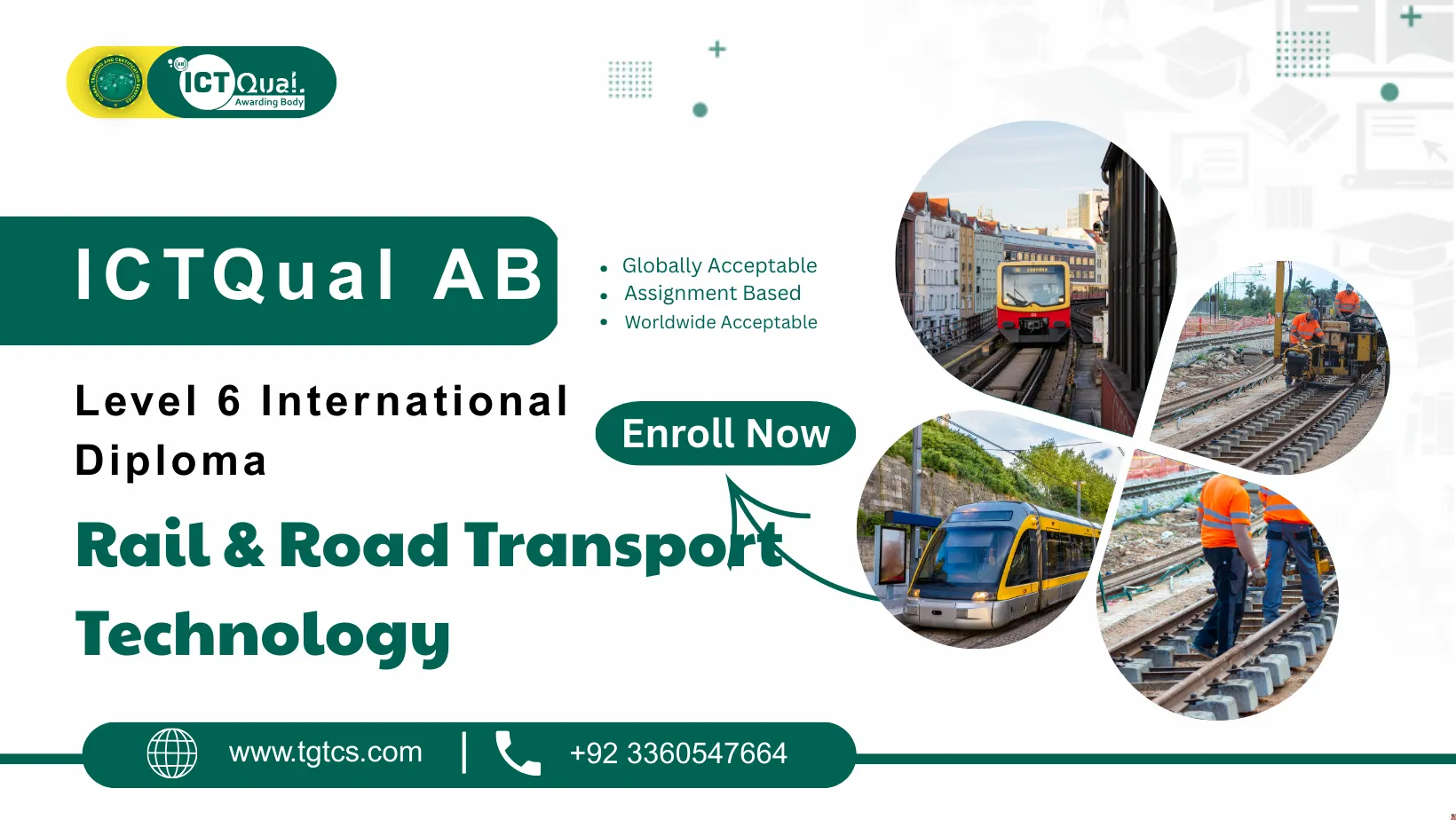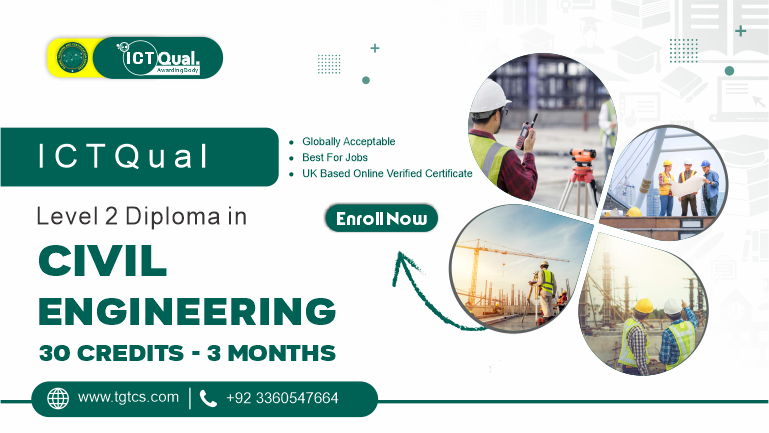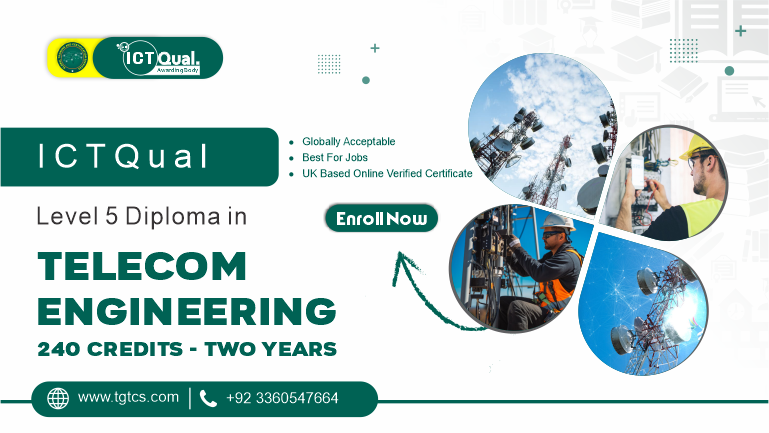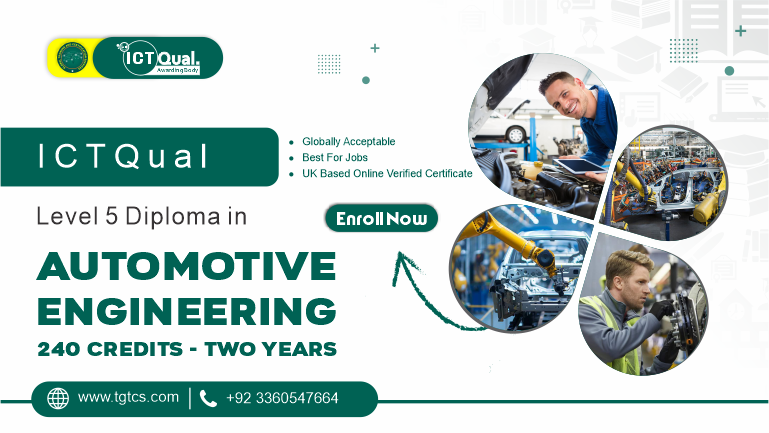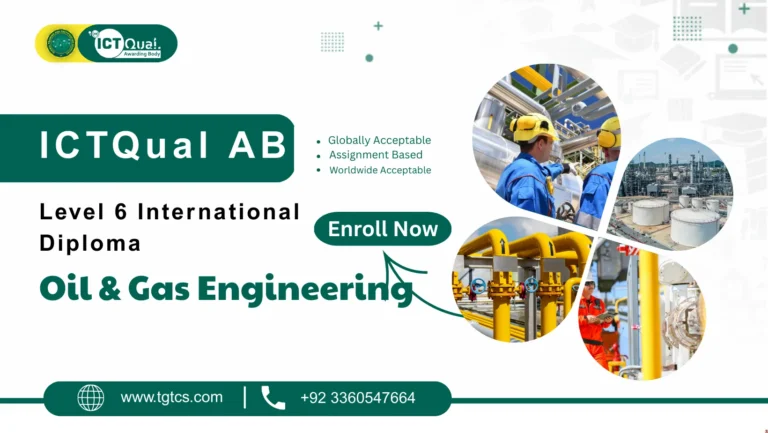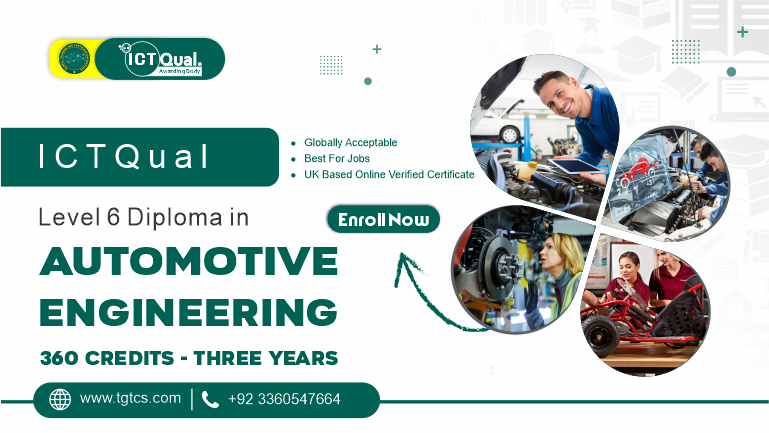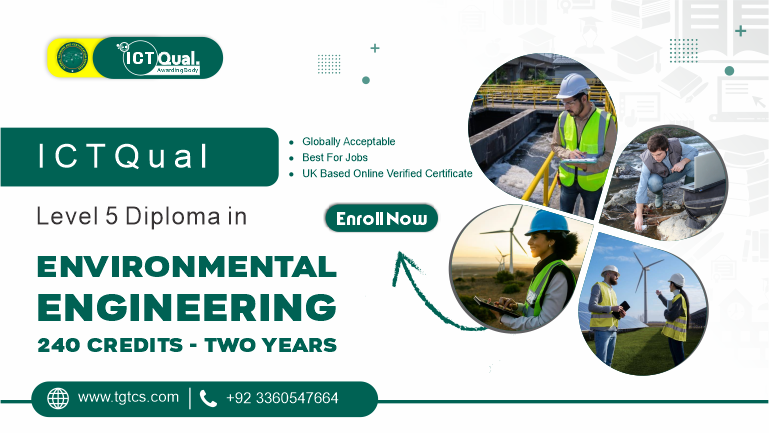ICTQual AB Level 6 International Diploma in Rail & Road Transport Technology
Efficient rail and road transport systems are essential for economic growth, trade, and sustainable mobility in the modern world. The ICTQual AB Level 6 International Diploma in Rail & Road Transport Technology equips learners with advanced knowledge, practical skills, and strategic expertise required to manage, innovate, and optimize rail and road transport operations globally.
This comprehensive program is designed for professionals, engineers, transport planners, logistics managers, and students seeking to advance their careers in rail and road transport technology. Learners will explore critical areas such as transport systems management, logistics optimization, railway engineering, road infrastructure design, fleet operations, transport safety, and intelligent transport systems, providing a deep understanding of modern transport networks.
The course emphasizes real-world applications alongside theoretical frameworks, enabling learners to implement effective transport solutions, manage operations efficiently, and ensure compliance with safety and environmental regulations. Through project-based learning, case studies, and simulations, learners develop competencies in transport planning, traffic management, vehicle and infrastructure maintenance, risk assessment, and digital solutions for transport management.
Graduates of this diploma emerge as highly competent professionals capable of leading transport projects, optimizing rail and road networks, and contributing to sustainable mobility solutions. They will be prepared to make informed strategic decisions, improve operational efficiency, and implement innovative transport technologies in diverse organizational and governmental contexts.
The Global Training and Certification Services is Approved Training Centre of ICTQual AB UK Ltd
Course Level and Credits
Level 6 International Diploma, 360 credits.
Suitable for professionals, transport engineers, logistics managers, and students seeking advanced knowledge in rail and road transport technology.
Mode of Study
Fully assignment-based; learn at your own pace.
Accessible from anywhere in the world, flexible for working professionals and career changers.
Global Recognition & Attestation
British Council verifiable, MOFA and Embassy attested.
Recognized for career advancement, employment, and professional credibility in rail, road transport, and logistics sectors globally.
Scope and Purpose
Comprehensive coverage of rail and road transport systems, infrastructure planning, fleet operations, transport safety, traffic management, and intelligent transport technologies.
Focus on both theoretical understanding and practical application in real-world rail and road transport scenarios.
Skills and Knowledge Gained
Rail and road transport management, fleet operations, traffic planning, infrastructure design, transport safety, logistics optimization, and intelligent transport systems.
Leadership and strategic decision-making skills for transport project management, operational efficiency, and regulatory compliance.
Career Benefits
Opens opportunities in transport companies, infrastructure planning agencies, logistics firms, government transport authorities, and consultancy services.
Enhances professional credibility, employability, and global recognition in the rail and road transport industry.
Target Audience
Professionals, transport engineers, logistics managers, and students aiming for careers in rail and road transport management, transport planning, and infrastructure development.
Unique Selling Points (USPs)
Flexible self-paced study, fully assignment-based.
Prestigious and globally recognized Level 6 diploma.
Ideal for leadership roles, international career advancement, and professional credibility in transport and logistics sectors.
Mandatory Unit
This qualification, the ICTQual AB Level 6 International Diploma in Rail & Road Transport Technology, consists of 36 mandatory units.
Year 1 – Foundations of Rail & Road Transport Technology
- Introduction to Rail & Road Transport Industry
- Principles of Transport Operations
- Transport Engineering Fundamentals
- Traffic Management and Control Systems
- Transport Law and Regulatory Frameworks
- Infrastructure Planning and Maintenance Basics
- Safety and Security in Rail & Road Transport
- Environmental Sustainability in Transport
- Logistics and Supply Chain Management
- Principles of Risk Management in Transport Operations
- Transport Economics and Policy
- Professional Ethics and Communication in Transport
Year 2 – Applied Transport Operations & Management
- Advanced Rail and Road Operations Planning
- Freight and Passenger Transport Management
- Transport Logistics Integration and Optimisation
- Infrastructure Project Management
- Safety Compliance and Risk Mitigation in Transport
- Crisis Management and Emergency Response
- Transport Finance, Budgeting, and Cost Control
- Environmental Compliance and Emissions Management
- Digitalisation and Smart Transport Technologies
- Human Resource Management in Transport Organisations
- Applied Case Studies in Transport Operations
- Operational Simulations and Practical Exercises
Year 3 – Strategic Leadership & Advanced Transport Management
- Strategic Management in Rail & Road Transport
- Transport Policy, Governance, and International Standards
- Legal Contracts and Regulatory Compliance in Transport
- Leadership and Decision-Making in Transport Operations
- Advanced Risk and Safety Management
- Infrastructure Planning and Strategic Development
- Global Supply Chain Management for Transport
- Emerging Technologies and Innovation in Transport
- Sustainability and Climate Change Adaptation in Transport
- Research Methods for Transport Technology
- Independent Research Project in Rail & Road Transport
- Capstone Project: Applied Strategic Transport Management
The ICTQual AB Level 6 International Diploma in Rail & Road Transport Technology is designed to equip learners with advanced knowledge, practical skills, and strategic expertise in rail and road transport systems, infrastructure planning, fleet operations, and logistics management.
Year 1 – Foundations of Rail & Road Transport Technology
Introduction to Rail & Road Transport Industry
- Understand the structure, functions, and global importance of rail and road transport systems
- Explore key stakeholders, roles, and trends shaping the transport industry
- Analyze operational challenges and opportunities in modern transport networks
- Gain foundational knowledge of passenger and freight transport systems
Principles of Transport Operations
- Learn the fundamentals of rail and road transport operations
- Understand fleet management, scheduling, and operational coordination
- Apply principles to optimize efficiency and service delivery
- Evaluate operational performance using industry-standard metrics
Transport Engineering Fundamentals
- Understand basic engineering concepts relevant to rail and road transport
- Learn design principles for transport infrastructure and vehicle systems
- Apply technical knowledge to support maintenance and operational planning
- Assess engineering solutions for safety, efficiency, and sustainability
Traffic Management and Control Systems
- Understand traffic flow theory, control systems, and operational strategies
- Apply traffic management techniques for both urban and interurban networks
- Monitor and optimize traffic operations to reduce congestion and delays
- Evaluate transport network performance for continuous improvement
Transport Law and Regulatory Frameworks
- Understand legal requirements governing rail and road transport operations
- Explore international, national, and local transport regulations
- Apply compliance strategies to operational and strategic decision-making
- Evaluate legal implications of contracts, safety breaches, and incidents
Infrastructure Planning and Maintenance Basics
- Understand transport infrastructure design, planning, and lifecycle management
- Learn maintenance strategies for railways, roads, and associated facilities
- Apply infrastructure planning principles to improve reliability and safety
- Assess performance indicators for infrastructure efficiency
Safety and Security in Rail & Road Transport
- Understand safety regulations, security standards, and risk assessment
- Implement emergency preparedness and incident response strategies
- Develop safety management systems for transport operations
- Evaluate operational safety and security performance
Environmental Sustainability in Transport
- Understand environmental challenges and sustainability practices in transport
- Apply strategies for emissions reduction, green logistics, and sustainable mobility
- Monitor environmental performance of transport operations
- Promote corporate responsibility and compliance with environmental standards
Logistics and Supply Chain Management
- Understand integrated supply chain principles in rail and road transport
- Optimize transport and distribution networks for efficiency and cost-effectiveness
- Apply logistics strategies to improve operational reliability and service quality
- Evaluate supply chain performance using industry metrics
Principles of Risk Management in Transport Operations
- Identify, assess, and mitigate risks in transport operations
- Develop contingency and emergency response plans for rail and road systems
- Apply risk management strategies to operational decision-making
- Monitor and review risk controls for continuous improvement
Transport Economics and Policy
- Understand economic principles affecting transport demand, supply, and pricing
- Analyze transport policies, regulations, and market trends
- Apply economic analysis to operational and strategic planning
- Evaluate policy impacts on transport efficiency and sustainability
Professional Ethics and Communication in Transport
- Develop professional communication and negotiation skills for transport stakeholders
- Understand ethical standards, corporate governance, and compliance in transport
- Apply reporting and documentation techniques for operational transparency
- Promote collaboration and ethical practices in transport organizations
Year 2 – Applied Transport Operations & Management
Advanced Rail and Road Operations Planning
- Plan and coordinate complex transport operations efficiently
- Optimize fleet utilization, scheduling, and routing strategies
- Apply operational performance analysis for continuous improvement
- Develop practical strategies for cost-effective transport operations
Freight and Passenger Transport Management
- Understand logistics and passenger service requirements in rail and road systems
- Manage freight and passenger operations with efficiency and safety
- Apply scheduling, capacity planning, and service optimization strategies
- Evaluate operational performance for customer satisfaction and reliability
Transport Logistics Integration and Optimisation
- Integrate transport operations with supply chain and logistics networks
- Apply optimization techniques for multimodal transport and distribution
- Analyze operational performance to reduce costs and improve efficiency
- Develop strategies for seamless logistics and transport coordination
Infrastructure Project Management
- Plan, implement, and monitor transport infrastructure projects
- Apply project management methodologies in rail and road construction and maintenance
- Evaluate resource allocation, risk, and cost-effectiveness
- Ensure projects meet quality, safety, and regulatory standards
Safety Compliance and Risk Mitigation in Transport
- Implement safety protocols, compliance measures, and operational risk strategies
- Monitor transport operations for adherence to safety regulations
- Apply mitigation strategies to prevent accidents and operational disruptions
- Evaluate safety performance and implement continuous improvement measures
Crisis Management and Emergency Response
- Develop emergency response plans for transport incidents
- Coordinate multi-agency crisis management and response efforts
- Apply risk assessment and incident reporting techniques
- Evaluate effectiveness of emergency procedures and operational readiness
Transport Finance, Budgeting, and Cost Control
- Understand financial planning, budgeting, and cost management in transport operations
- Analyze expenditures, revenue streams, and cost-efficiency strategies
- Apply financial tools for strategic decision-making
- Monitor financial performance and optimize operational investments
Environmental Compliance and Emissions Management
- Implement environmental regulations and sustainability standards in transport operations
- Monitor and control emissions from rail and road vehicles
- Apply strategies for waste reduction, energy efficiency, and green mobility
- Evaluate environmental performance against regulatory benchmarks
Digitalisation and Smart Transport Technologies
- Utilize digital tools, software, and automation in transport management
- Apply intelligent transport systems, IoT, and data analytics for operational efficiency
- Integrate digital solutions into fleet management, traffic monitoring, and logistics
- Evaluate technology performance to enhance transport safety and reliability
Human Resource Management in Transport Organisations
- Manage workforce planning, recruitment, and professional development in transport
- Apply leadership and team management strategies for operational success
- Promote effective communication, motivation, and workforce engagement
- Ensure compliance with labor regulations and safety standards
Applied Case Studies in Transport Operations
- Analyze real-world scenarios in rail and road transport operations
- Apply theoretical knowledge to practical transport challenges
- Conduct operational planning exercises to solve complex problems
- Evaluate outcomes to identify lessons and best practices
Operational Simulations and Practical Exercises
- Conduct simulations of transport operations for risk-free learning
- Apply operational planning, logistics, and safety strategies in practical exercises
- Evaluate decisions and optimize operational performance
- Develop problem-solving and critical-thinking skills in realistic scenarios
Year 3 – Strategic Leadership & Advanced Transport Management
Strategic Management in Rail & Road Transport
- Develop long-term strategic plans for transport organizations
- Align operational decisions with organizational goals and market trends
- Analyze industry challenges and competitive dynamics
- Apply strategic tools to enhance efficiency, safety, and profitability
Transport Policy, Governance, and International Standards
- Understand international, national, and local transport policies and standards
- Apply governance frameworks to ensure compliance and operational efficiency
- Analyze policy impacts on transport operations and infrastructure
- Implement best practices for sustainable and safe transport systems
Legal Contracts and Regulatory Compliance in Transport
- Understand legal frameworks governing transport contracts and operations
- Analyze liabilities, claims, and dispute resolution procedures
- Apply compliance strategies to operational and project management
- Ensure adherence to international and local transport laws
Leadership and Decision-Making in Transport Operations
- Develop leadership skills for operational and strategic management in transport
- Apply critical thinking and decision-making frameworks in complex scenarios
- Lead multidisciplinary teams in rail and road operations
- Evaluate leadership effectiveness and operational outcomes
Advanced Risk and Safety Management
- Implement advanced risk management techniques for rail and road transport
- Develop safety protocols and emergency preparedness strategies
- Monitor and mitigate operational hazards
- Evaluate safety performance for continuous improvement
Infrastructure Planning and Strategic Development
- Plan and develop transport infrastructure strategically for long-term sustainability
- Optimize road networks, rail lines, and transport facilities
- Apply project and resource management strategies for infrastructure projects
- Monitor performance metrics for efficiency, reliability, and safety
Global Supply Chain Management for Transport
- Manage international supply chain operations for freight and passenger transport
- Optimize multimodal logistics and transportation networks
- Apply risk assessment and performance analysis in global supply chains
- Implement strategies to enhance efficiency, reduce costs, and ensure sustainability
Emerging Technologies and Innovation in Transport
- Explore advanced transport technologies such as ITS, IoT, AI, and digital platforms
- Apply innovative solutions for fleet management, traffic monitoring, and logistics optimization
- Integrate technology into operational and strategic planning
- Evaluate the impact of technological innovation on efficiency and compliance
Sustainability and Climate Change Adaptation in Transport
- Implement sustainable transport practices to reduce environmental impact
- Develop strategies for climate adaptation in transport infrastructure and operations
- Monitor emissions, energy use, and regulatory compliance
- Promote sustainable mobility and corporate social responsibility
Research Methods for Transport Technology
- Apply quantitative and qualitative research methods to transport studies
- Conduct industry analysis and data-driven decision-making
- Develop research projects addressing operational and strategic challenges
- Present findings effectively to stakeholders and decision-makers
Independent Research Project in Rail & Road Transport
- Conduct in-depth research on a specific rail or road transport topic
- Apply analytical and project management skills to solve real-world challenges
- Provide evidence-based recommendations for operational or strategic improvement
- Demonstrate professional competence, critical thinking, and problem-solving skills
Capstone Project: Applied Strategic Transport Management
- Integrate knowledge from all course units into a comprehensive transport project
- Design and implement strategic solutions for rail or road transport systems
- Analyze outcomes and evaluate operational and strategic effectiveness
- Showcase leadership, decision-making, and project management expertise
The ICTQual AB Level 6 International Diploma in Rail & Road Transport Technology equips learners with the knowledge, practical skills, and strategic expertise required to excel in rail and road transport management, logistics, and infrastructure planning.
Enhanced Career Opportunities
- Gain a globally recognized Level 6 qualification in rail and road transport technology
- Access leadership roles in transport companies, logistics firms, infrastructure agencies, and consultancy services
Practical Skills Development
- Acquire hands-on skills in fleet operations, traffic management, transport logistics, and infrastructure maintenance
- Develop expertise in operational planning, risk management, and emergency response in transport systems
Strategic and Analytical Competence
- Learn to analyze transport networks, policy frameworks, and economic trends
- Build decision-making skills for optimizing operations, resource allocation, and safety compliance
Policy, Governance, and Compliance Knowledge
- Understand international and national transport laws, safety regulations, and governance standards
- Apply regulatory compliance strategies to ensure safe and efficient transport operations
Innovation and Sustainable Transport Practices
- Utilize emerging technologies, digital tools, and smart transport systems for operational efficiency
- Implement sustainable mobility practices and climate change adaptation strategies
This diploma prepares learners to become competent professionals and strategic leaders capable of managing complex transport systems, driving operational efficiency, ensuring safety compliance, and promoting sustainable growth in rail and road transport sectors worldwide.
The ICTQual AB Level 6 International Diploma in Rail & Road Transport Technology is designed for learners seeking to advance their careers in rail and road transport management, logistics, infrastructure planning, and transport operations.
Transport Professionals
- Enhance operational and management skills in rail and road transport systems
- Gain expertise in fleet management, traffic control, and transport logistics
Career Changers in Transport Industry
- Transition into transport management and infrastructure planning roles with practical knowledge
- Acquire competencies in regulatory compliance, transport finance, and strategic planning
Organizational Leaders and Managers
- Improve leadership and decision-making skills for transport operations and projects
- Ensure compliance with international transport laws, safety, and governance standards
Logistics and Supply Chain Specialists
- Develop expertise in supply chain integration, route optimization, and multimodal transport operations
- Optimize operational efficiency and enhance reliability across transport networks
Researchers and Academics
- Deepen understanding of transport economics, policy, and sustainable mobility solutions
- Conduct applied research projects and contribute to innovation in transport management
This course prepares learners to become skilled professionals and strategic leaders capable of managing complex transport operations, driving operational efficiency, ensuring safety compliance, and promoting sustainable transport solutions globally.
Course Overview
Course Level
Level 6
Course Units
36 Units
Credits
360
Duration
3 years
